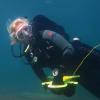1. For cold water such as ice diving, I agree that a sealed first stage such as a Zeagle, Apeks, Dacor, Mares, Posiden, AquaLung with sealed first stage kit, Sherwood, etc. would be preferable to a flow thru piston such as ScubaPro, Atomic, Cressi Sub, Oceanic, etc, however most freeze ups with either type of first stage are caused by pushing the purge button above water to check to see if the regulator is functional. By doing so the regulator does not have the advantage of the heat sinc that occurs when it is submersed in water. As a result due to "latent heat loss" caused by air molecules moving away from each other a freeze up can occur. In other words, don't purge your reg above water if ice diving. For those not familar wtih the term 'latent heat loss' its the way air conditioning works. When molecules move away from each other the resulting space between molecules loses heat which in non-technical terminology cools the air. (Sorry about the 'engineer' in me coming out from time to time!) So the reason that sealed first stages are generally preferable is because the internal moving parts are not in contact with water that can possibly freeze.
2. As for warm water diving, most of the upper end first stages regardless of style aka sealed or piston, are sufficient for what most people need or expect from them. Most of the noticable changes in performance will be in the design and tuning of the second stage.
As a side note, a long time ago the ratio between diaphram size, lever length and fulcrum length were established because they worked. But in the never ending struggle to make second stages smaller, the inescapable geometrical truth is "Less is Less". This means that performance has been sacraficed for size. So yes...in most cases....size does matter!
Edited by Senior Tech, 30 January 2005 - 02:20 PM.

















